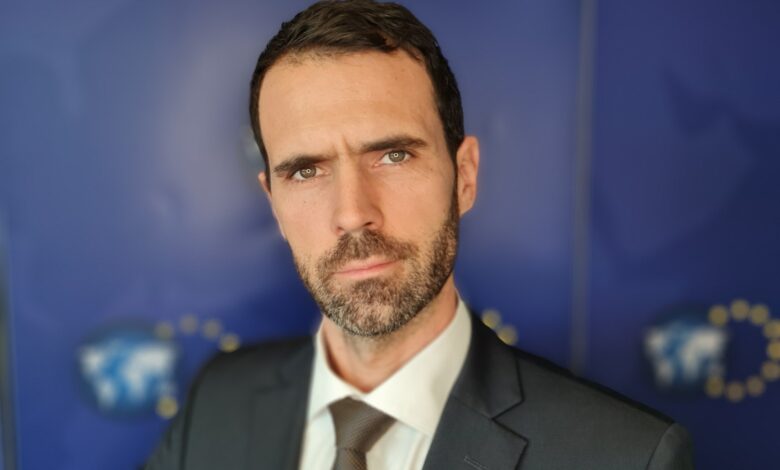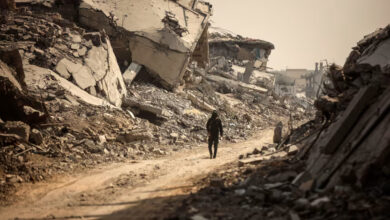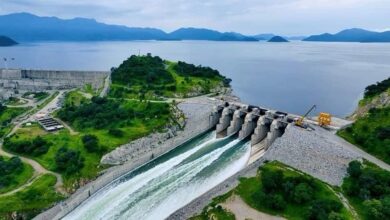
In an interview with the European Union (EU) Spokesperson for the Middle East and North Africa Louis Miguel Bueno, he stressed that Egypt is playing a crucial and important role in the Libyan crisis, expressing the European union’s readiness to provide assistance to resolve the crisis of the renaissance dam.
“What is happening in the Ethiopian region of Tigray is a tragic humanitarian crisis” , was his bold statement.
Bueno said the relationship between Egypt and the EU is “strategical”, praising the end of the state of emergency and the launch of the national human rights strategy.
- How would do you describe the relationship between Egypt and the EU now?
The relationship between Egypt and the EU is strategic, and we are currently discussing a new set of partnership priorities. Our work will focus on supporting the second waves of reform in the country, strengthening Egypt’s vision towards 2030.
Promoting pluralism in securing funding for developmental projects, dealing with the social, economic impact of the covid-19 pandemic, and supporting women’s empowerment are all important priorities.
We are also working with energy ministries to develop an energy strategy, which we did 10 years ago, so we are updating this with a very strong focus on renewable energy. We welcome Egypt’s decision to end the state of emergency and implement its new national human rights strategy, as very important references to positive developments in the country.
- How do you view Egypt’s recent reforms?
The EU and Egypt are strong partners in the field of development. Cairo has done a lot of work in recent years by improving the social and economic situation of a large part of the population, with a strong focus on the rural population in line with the sustainable developmental goals and the national development strategy of Egypt.
Alongside the list of priorities of the partnership between Egypt and the EU, we have agreed to support things like health and education amongst others.
The EU provided support for the budget of the ministry of health worth 89 million Euros to respond to the health crisis. There are a number of targeted projects with the ministry including social solidarity, the national council of women, the united nations development program, UNFPA and un women to reduce the impact of the epidemic.
- What about Egypt’s role in the Libyan crisis?
Egypt has a crucial role to play in supporting the stability in Libya, as president of the economic working group, where the EU also participates.
Egypt is working to reach an agreement between Libyans on how to address long-term economic challenges in a unified and transparent way, and we require Libya to make sure that the economy will become an engine of peace rather than an engine of conflict, as has been the case so far.
The priority is to hold fair and comprehensive elections on December 24, as well as the full implementation of the ceasefire, which is necessary to restore national sovereignty and to preserve the territorial integrity of Libya.
- Do you think the Paris conference has strengthened the trend to hold Libyan elections on time?
The Paris conference is an appropriate opportunity to keep Libya at the top of the international agenda at this critical juncture of the country. The conference focused on two main priorities for the coming weeks: the holding of presidential and parliamentary elections, within a timetable set by the electoral commission, starting December 24, and the concrete implementation of the action plan approved by the Libyan joint military commission (5+5) on the withdrawal of mercenaries and foreign troops, and the presence of the EU in the conference was particularly important to confirm our readiness to mobilize all our means to accompany Libya in this complex and urgent process.
- What is the EU’s position on the crisis of the renaissance dam under Ethiopian intransigence?
The EU believes that the three Nile basin countries (Egypt, Sudan and Ethiopia) should reach an agreement on the issue of the renaissance dam, which is essential, necessary and inevitable for the benefit of the Nile basin countries. We have always supported consultations and negotiations in this regard, and we are ready to provide the necessary assistance.
- What is the EU’s position on Ethiopian violations in the Tigray region?
The EU remains deeply concerned about the tragic humanitarian crisis unfolding in the region of Tigray, and its regional repercussions, and not only have we spoken loudly but have also been active in our communication at the political and humanitarian levels.
The EU urges all parties to end the violence immediately in the Tigray region, to ensure that humanitarian assistance reaches all those in need in all regions.
This year, UNHCR has provided more than 53 million euros in humanitarian aid and first funding to the most vulnerable people in Ethiopia, including those affected by the conflicts in the Ethiopia’s Tigray region.
Additional funding can be provided once adequate safe access requirements and expertise are met on the ground.
- What about your efforts in the Lebanese crisis?
The crisis between Lebanon and Saudi Arabia is bilateral, and the EU as a partner of the two countries hopes to restore bilateral relations fully through dialogue. The EU has been supporting the Lebanese people for years. Since 2011, we have allocated 2.8 billion euros to Lebanon, of which 2 billion euros have been allocated to support it in dealing with the Syrian crisis, where Lebanon hosts more than 1.5 million Syrian refugees. Additionally, we will not reduce our financial assistance to Lebanon, on the contrary, we will try to increase it and facilitate the agreement with the international monetary fund, and the implementation of major reforms in the areas of governance and the economy remains very urgent.
The EU and other members of the international community have had effective talks aimed at reaching an early agreement with the IMF that should begin immediately to avoid financial collapse.
- Do you think there is a breakthrough in America’s return to the Iran nuclear deal?
I believe that the goal for the United States remains to return to the convention and resume full implementation by all parties as soon as possible, and the high representative for the foreign policy of the EU, as coordinator of the joint comprehensive plan of action, is working closely to that end. Negotiations have resumed in Vienna, as well as the EU team which is determined to make progress. We consider that the return of the US to this important agreement, which forms the pillar of the international non-proliferation regime, is necessary to ensure peace and stability in the region.
- Do you believe that the multiple Middle East crises and the corona pandemic have affected interest in the Palestinian issue?
Resolving the Palestinian-Israeli conflict remains a priority for the EU, and I think that if we will seriously address tensions. The most important thing is to relaunch an urgently meaningful political process that shows to the Palestinians and Israelis that there is real hope for a better future, and the EU is ready to support the parties in this process.
The EU will continue to work with the Palestinians and Israelis alongside the international quartet and other stakeholders, in the region and abroad, to make progress towards a just and lasting peace on the basis of a two-state solution.
- The crisis of migrants wishing to cross into Europe via Poland has recently erupted, so what are your actions regarding this issue?
The Belarusian regime use people for political purposes; these people are lured by the regime and are given false promises. The regime has created an artificial crisis on the borders of the EU, which is responsible for what is happening. This abhorrent behavior is a violation of international law that requires a strong international response. The G7 has condemned Belarus for sponsoring human trafficking. We have moved to impose new sanctions on the Belarusian regime, which we call upon to meet the humanitarian needs of those migrants caught up in this trap. In the meantime, we are reaching out to our partners in the region, including in that Egypt, to get their help in putting an end to this malicious scheme.
- While you strongly support democracy and human rights, How do you perceive the inhuman treatment of refugees by the Belarusian regime?
The EU and its member states have been fully committed to their international obligations to refugees since August. the EU has accepted more than 18,000 asylum seekers from Afghanistan alone. Additionally, the EU has been at the forefront of helping those displaced by the Syrian war by saving more than 24 billion euros since 2011. Now, the Belarusian regime has decided to put pressure on the EU by exploiting vulnerable migrants to distract attention from its persecution of citizens, with Belarusian authorities arresting more than 35,000 people in recent months, closing NGOs and sentencing journalists to prison in closed trials, and threatening the Belarusian regime with the use of gas as a weapon, which is unacceptable. But if that happens, the EU will expect suppliers to abide by contracts and use alternative methods.




